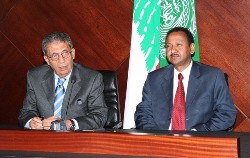Sudan express reservations on the Arab League’s ICC plan
August 17, 2008 (CAIRO) – The Sudanese government for the first time unveiled disagreements with the Arab League on a plan it formulated to counter a move by the International Criminal Court (ICC) to indict Sudan president.

Following that Sudan has been looking into ways that would allow it to avoid confrontation with the international community over the ICC. The Arab League Secretary General Amr Moussa carried a number of proposals to Al-Bashir last month which included conducting internal trials for Darfur war crimes suspects.
But the Sudanese presidential adviser Mustafa Ismail was quoted by the daily Al-Hayat newspaper as telling reporters in Cairo after meeting with Moussa “that there are some parts of the plan that need more discussions”.
Ismail also insisted that the Sudanese judiciary is capable of looking into the Darfur war crimes and noted the recent appointment of a special prosecutor for Darfur by Sudan’s justice minister.
The Sudanese official also accused the ICC of targeting third world countries only.
“We did not see that the court looked into what superpowers did in Iraq, Palestine or Afghanistan” he said.
Ismail reiterated his country’s refusal to hand over any Sudanese citizens abroad and stressed that local investigations into Darfur crimes “will not exclude the president, ministers or janitors”.
However Sudan’s presidential adviser refused to say what will be the next steps if an arrest warrant Al-Bashir is issued by the ICC.
A political analyst speaking to Sudan Tribune from Khartoum said that it is unlikely that the Sudanese government is serious about prosecuting Darfur war crimes suspects.
“Any genuine investigations will implicate some of their own officials. They simply want a way out of this accountability thing altogether” the analyst said on condition of anonymity.
Sudan’s appointment of a special prosecutor was seen as concession that would provide leverage to the Arab League and African Union (AU) when requesting a resolution from the UN Security Council (UNSC) deferring Al-Bashir’s indictment under Article 16 of the ICC Statute.
But some political figures cautioned that establishing special courts at this time may be belated.
Sudan’s former prime minister and leader of the Umma Party Al-Sadiq Al-Mahdi told the Qatar based Al-Jazeera Arabic TV that the move is “unfortunate” and “sends wrong signals to the international community”.
Also the Secretary General of Sudan’s communist party Ibrahim Nugud speaking to Al-Jazeera said that “any decision [on special courts] made that doesn’t convince rebel groups is worthless”.
Sudan has not ratified the Rome Statute, but the UNSC triggered the provisions under the Statute that enables it to refer situations in non-State parties to the world court if it deems that it is a threat to international peace and security.
(ST)

Mr Point
Sudan express reservations on the Arab League’s ICC plan
Ismail said “We did not see that the court looked into what superpowers did in Iraq, Palestine or Afghanistan”.
If he knows of organised murder and systematic rape carried out in those country on the same scale as happened in Darfur let him raise it with the ICC himself.